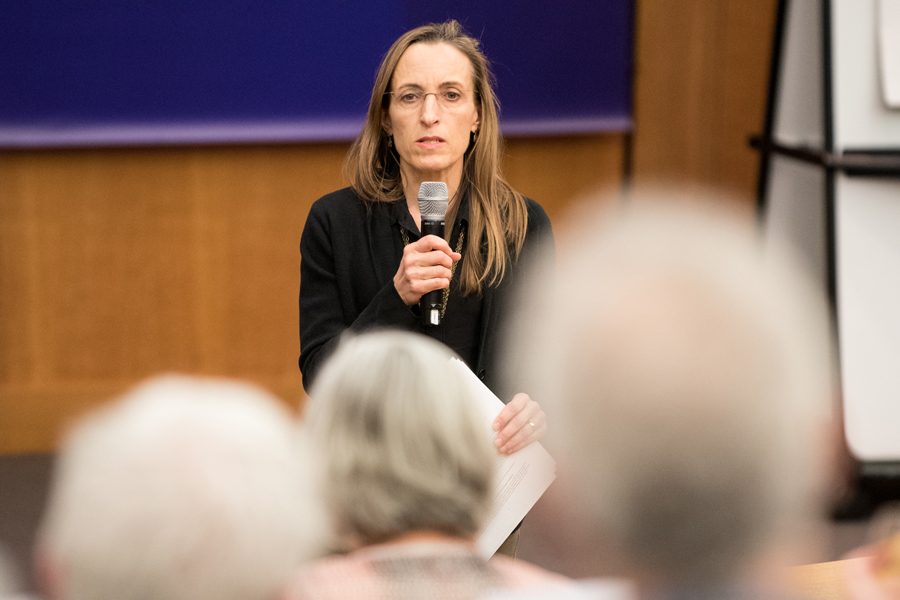Faculty Senate reviews sexual misconduct policy
Colin Boyle/Daily Senior Staffer
Linguistics Prof. Jennifer Cole speaks at Wednesday’s Faculty Senate meeting. Faculty discussed proposed updates to the University’s sexual misconduct policy.
February 15, 2018
Linguistics Prof. Jennifer Cole led a discussion about Faculty Senate’s proposed updates to Northwestern’s sexual misconduct policy at a meeting on Wednesday.
After the policy was recently updated, administrators called for feedback from students and other University community members in January regarding the changes, which included modifying the definitions of stalking and dating or domestic violence. The policy currently states that NU prohibits all forms of sexual misconduct, including but not limited to sexual assault, sexual exploitation, dating or domestic violence and sexual harassment.
“Such conduct violates the principles and values of our institution and disrupts the living, learning and working environment for students, faculty staff and other community members,” Cole said.
Faculty Senate President and Communication Prof. Robert Hariman said they discussed the policy so that the administrative team can make further revisions to the proposal before bringing it to administration. It will be discussed again at the next Faculty Senate meeting, he added.
The proposal outlines the purpose of the sexual misconduct policy, which is “to foster an environment in which all members of the campus community are safe, secure and free from sexual misconduct of any form,” Cole said.
It also recommends a more explicit response to sexual misconduct that occurs outside of the United States, such as in study abroad programs. The policy clarifies that if an incident of sexual misconduct occurs between members of the NU community in a different country, those people still have access to NU resources.
“For individuals outside of the United States, they are subject to the laws of that land as far as sexual misconduct goes,” Cole told The Daily. “(But) Northwestern University provides any kind of support or guidance services for an individual on the Northwestern campus, so similar support services should be extended to the fullest extent possible.”
The updated proposal is more specific about the services the University offers in cases of sexual misconduct. Cole said there should be greater uniformity in the medical and support services across all NU sites, including study abroad sites.
It also encourages people to seek medical help immediately after experiencing sexual misconduct. The proposal addressed the problem that the availability of medical services for sexual assault survivors — such as emergency contraceptives and evidence collection, or “rape kits” — is currently dependent on where students go for medical help and what campus they are on.
Cole said the policy needs to clearly state that if people experience sexual assault, they can get emergency contraceptives from NU Health Services, but for evidence collection they need to seek help elsewhere.
“Evidence collection in particular has to be administered by trained personnel in a facility that can handle it, and that’s just not the case at NU Health Services,” Cole told The Daily. “People need to know if they experience sexual assault on this campus … they should also call a taxi and get you a hospital so you can get that service.”
The proposed sexual misconduct policy outlines procedures for investigation and resolution of sexual misconduct policy violations. Cole said the strongest recommendation was to loosen numerous restrictions on the role of an adviser or legal counsel to the complainant or the respondent so that all parties have access to the full range of support they need in investigating alleged sexual misconduct violations.
Cole said there is language in the new policy that addresses definitions of consent and prohibited conduct.
McCormick Prof. Gregory Ryskin proposed adding a “presumption of innocence” to the sexual misconduct policy. Earth and Planetary Sciences Prof. Suzan van der Lee objected to this addition, and suggested adding a presumption of confidentiality instead.
“It’s usually a case of ‘he said, she said,’” van der Lee said. “If there is a literal presumption of innocence, that’s like saying the victim coming forward is lying presumptuously.”
Email: [email protected]
Twitter: @emilychaiet


